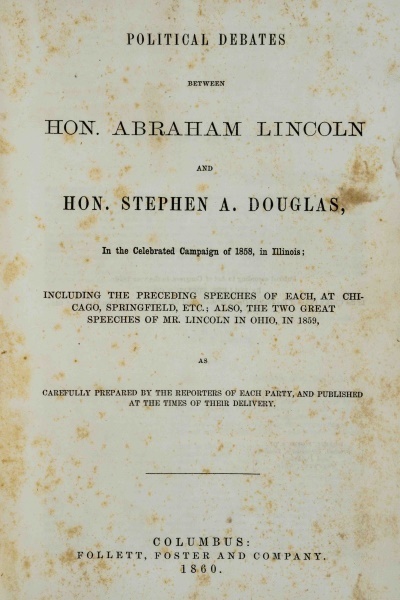Lincoln: Political Debates of 1858
In the fall of 1858, two men were running for election to the Illinois Senate. Stephen A. Douglas, a Democrat and incumbent, was hoping to gain a third term. Abraham Lincoln, a member of the newly formed Republican party, was no stranger to political service, having been elected to the U.S. Senate (1847–49).
Across the nation, people watched the campaign closely—and with good reason. As was the practice at the time, senators elected to their state legislatures were then elected by their peers to the U.S. Congress. And the issue of slavery, particularly its status in territories aspiring to statehood, was at the heart of each man’s campaign.
Douglas and Lincoln made public appearances in each of Illinois’s nine Congressional districts. Having already spoken in Chicago and Springfield, the two agreed to meet in face-to-face debates in each of the remaining districts (Political Debates 64–66). What we know as the Lincoln-Douglas Debates refer to the candidates’ seven joint appearances from August 21 to October 15 in Ottawa, Freeport, Jonesboro, Charleston, Galesburg, Quincy, and Alton. The exchanges, especially those held in Freeport, Quincy, and Alton, attracted audiences by the thousands because they bordered neighboring states—some slave, some free.
The debates pushed Lincoln into the national spotlight as newspaper reporters covering the debates followed the duo throughout the campaign trail. In strategic speeches, Lincoln forced Douglas to answer for the contradictions in his politics. Throughout the campaign, Lincoln dutifully kept newspaper clippings that included stenographers’ written records of the debates and coverage related to the campaign. And in the spring of 1859, Lincoln made a tactical, savvy decision. He sought to publish them (iii–iv). Responding to an invitation by George Parsons, chairman of the Republican central committee, Lincoln carefully edited all nine speeches as well as two he delivered in Columbus and Cincinnati in 1859 (he also spoke in Dayton) and relevant correspondence. Referring to Douglas’s remarks, Lincoln cautioned, “It would be an unwarranted liberty for us to change a word or a letter” (iv). Lincoln submitted the manuscript to Follett, Foster and Co. of Columbus, Ohio. Its publication in the spring of 1860 couldn’t have been timelier. Lincoln’s growing reputation as an orator coupled with the widespread circulation of the book helped him secure the presidency several months later against Douglas.
Lincoln’s inclusive choices for the manuscript chronicle his position on slavery up until he accepted the Republican nomination for president (Speeches and Presidential Addresses 80–84). Taken together, the speeches reveal Lincoln’s wisdom, direct but elegant style, and rhetorical acumen. In his second speech (Chicago), Lincoln voices his well-known statement, “A house divided against itself cannot stand.” Beginning with the first joint meeting (Freeport), Lincoln maneuvers Douglas into a corner by asking him to reconcile his support of the KansasNebraska Act (1854) that allowed new states “popular sovereignty” in deciding whether or not to allow slavery with the U.S. Supreme Court’s Dred Scott decision (1857). The latter verdict held that Congress had no power to regulate slavery in federal territories and tacitly undermined the authority of state governments.
Douglas offered a compromise, thereafter referred to as the Freeport Doctrine, that gave people of new states the right to make decisions about slavery. While Douglas appeased pro-slave constituencies, he antagonized abolitionists, effectively splitting the Democratic Party. Lincoln used the flaws in Douglas’s arguments to his advantage, underscoring in subsequent speeches the inherent incompatibility of slavery with democracy and the threat slavery posed to a nation founded on ideals of freedom and justice for all. Lincoln’s words, then as now, attest to the power of language to move our minds and hearts.
—Margaret Strain, PhD, Professor, English
Excerpt from Abraham Lincoln's "Political Debates between Hon. Abraham Lincoln and Hon. Stephen A. Douglas in the Celebrated Campaign of 1858, in Illinois" read by Herbert Martin, Professor Emeritus. University of Dayton. Department of English
Sources
Lincoln, Abraham. Political Debates between Hon. Abraham Lincoln and Hon. Stephen A. Douglas, In the Celebrated Campaign of 1858 in Illinois; Including the Preceding Speeches of Each, at Chicago, Springfield, etc.; also the Two Great Speeches of Mr. Lincoln in Ohio, in 1859, as Carefully Prepared by the Reporters of Each Party, and Published at the Times of Their Delivery. Columbus: Follett, Foster, and Company, 1860. Print.
—. Speeches and Presidential Addresses, 1959-1865, Together with Conversations and Anecdotes, Related by F. B. Carpenter in “Six Months in the White House.” Life and Works of Abraham Lincoln. Vol. 9. New York: Current Literature Publishing Company, 1907. Print.

